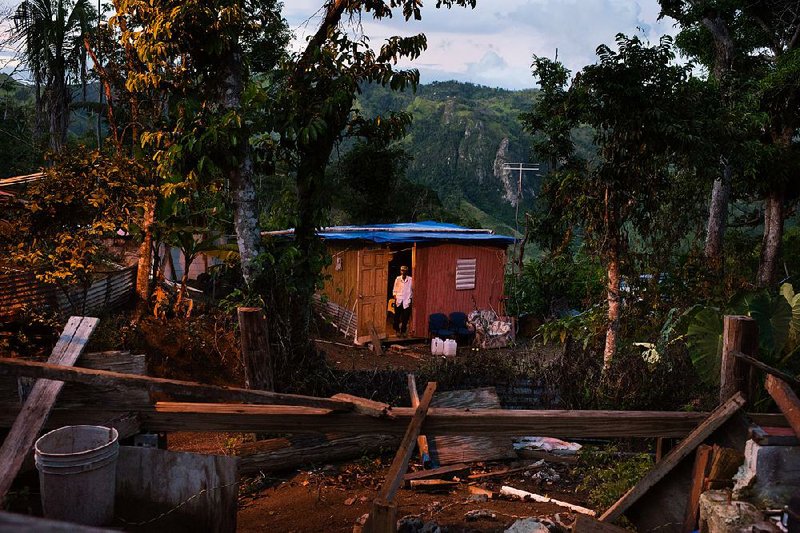Puerto Rico has started cutting benefits paid out by a food-stamp program used by more than 1 million of its residents, as federal lawmakers have not provided the island with additional emergency disaster funding amid opposition from President Donald Trump's administration.
On Monday, Puerto Rico started reducing food-stamp benefits by an average of 25 percent, part of an effort to sustain a program that has seen a dramatic increase in demand in the aftermath of Hurricane Maria in 2017, said a spokesman for Puerto Rico's department of family affairs.
The food-stamp benefit is currently distributed monthly to about 1.3 million of its residents, or 43 percent of those living on the island, the spokesman said. The reductions bring the benefit levels back to where they were before the hurricane.
The benefit cut, caused by an impasse among federal lawmakers over aid funding for the U.S. territory, has sparked new fears among Puerto Ricans about a critical lifeline for poorer residents amid an increase in hunger since the hurricane made its mark.
"It is dangerous. People don't have enough money to buy food already," said Socorro Rivera, executive director of La Fondita de Jesus, a nonprofit near San Juan that provides food for the homeless. Rivera worries about being overwhelmed with new requests if the issue is not resolved soon.
"It's obvious a lot of people will have severe problems," Rivera said.
Several federal proposals have emerged that could quickly fund the program, though only temporarily. The Trump administration has now given its support for $600 million in additional food-stamp benefits for Puerto Rico as part of a broader package spearheaded by Sen. David Perdue, R-Ga., a spokesman for the senator said.
The Trump administration had previously dismissed House Democrats' proposed $600 million plan to extend additional aid as "excessive and unnecessary," amid a report in The Washington Post that Trump told top White House officials he did not want a single dollar going to Puerto Rico because he thought the island was not using the money properly and was exploiting the federal government.
The prospects of a deal are uncertain. Perdue included funding for the Puerto Rico food-stamp program in a separate bill aiming to give financial aid for farmers in states such as Georgia to improve the legislation's chances of passing, a spokesman for Perdue said.
House Democrats in January approved funding for Puerto Rico that would go beyond Perdue's legislation, including a measure that would reduce Puerto Rico's requirement to share the costs of some reconstruction projects.
Hurricane Maria struck Puerto Rico and the U.S. Virgin Islands in September 2017, leading to thousands of deaths, causing an estimated $90 billion in damages, and devastating an economy that had already been in a recession for more than a decade.
Congress and the Trump administration have since approved more than $40 billion in emergency recovery money, as well as $1.27 billion in special food-stamp funding, said Federico de Jesus, principal of FDJ Solutions, a consulting firm, and the former deputy director of the Puerto Rico governor's office in Washington, D.C. At least $19 billion of that $40 billion has not yet been spent, de Jesus said.
Puerto Rico's food-stamp program is uniquely dependent on periodic help from Congress, though the island does not have a voting representative in either the House or Senate, or a say in presidential elections.
In mainland U.S. states, food-stamp benefits expand or contract according to each state's need. During the U.S. recession, for instance, the size of the federal food-stamp programs skyrocketed, as did the number of Americans who rely on it.
Puerto Rico's program works differently. The island administers a separate program -- called the Nutritional Assistance Program, rather than the Supplemental Assistance Nutrition Program received by mainland states -- through an annual block grant provided by the federal government.
Because of emergency funding from Congress, food-stamp benefits for Puerto Rico residents rose to $649 a month for a family of four after Hurricane Maria, matching the size of the benefit a family of four typically receives in the rest of the United States. But with cuts starting, Puerto Rico has returned to paying $410 a month for a family of four on food-stamp benefits, or about 40 percent less than that received by U.S. families, a spokesman for Puerto Rico's Department of Families said.
Even if approved by Congress, the additional $600 million allocation would only fund the island's food-stamp program until September 2019, said de Jesus, the former deputy director in the Puerto Rico governor's office.
Information for this article was contributed by Laura Reiley of The Washington Post.
A Section on 03/09/2019
